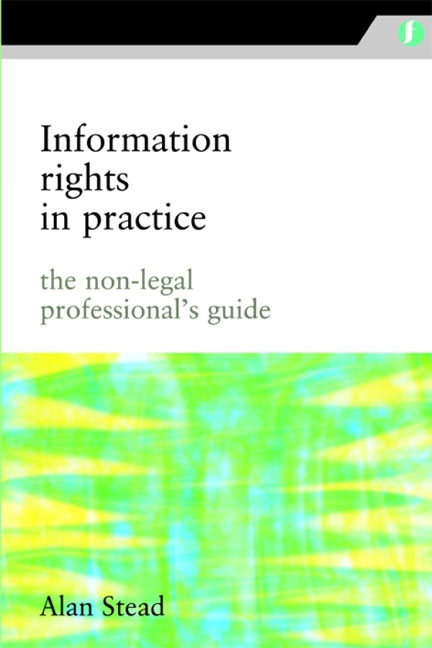Book contents
- Frontmatter
- Contents
- Acknowledgements
- Table of statutes and case law
- Abbreviations
- 1 Introduction
- 2 Data Protection Act 1998
- 3 Definitions of personal data
- 4 The scope of the Data Protection Act
- 5 The data protection principles
- 6 Access to personal data
- 7 Data sharing
- 8 The Freedom of Information Act 2000 and Environmental Information Regulations 2004, SI 2004/3391
- 9 Scope of the Freedom of Information Act 2000 and the Environmental Information Regulations 2004
- 10 Application of exemptions and exceptions
- 11 The public interest test
- 12 Publication schemes
- 13 Compliance, the Information Commissioner and the Information Tribunal
- 14 Disclosure logs
- 15 Records management – Section 46 code of practice
- 16 Other legislation
- 17 Interaction of the legislation
- 18 Summary
- Appendix 1 Data protection principles
- Appendix 2 Flow chart of FOI
- Appendix 3 Exemptions and exceptions under the Freedom of Information Act 2000 and the Environmental Information Regulations 2004
- Appendix 4 Bibliography and useful web addresses
- Appendix 5 Published standards for records management
- Index
17 - Interaction of the legislation
Published online by Cambridge University Press: 09 June 2018
- Frontmatter
- Contents
- Acknowledgements
- Table of statutes and case law
- Abbreviations
- 1 Introduction
- 2 Data Protection Act 1998
- 3 Definitions of personal data
- 4 The scope of the Data Protection Act
- 5 The data protection principles
- 6 Access to personal data
- 7 Data sharing
- 8 The Freedom of Information Act 2000 and Environmental Information Regulations 2004, SI 2004/3391
- 9 Scope of the Freedom of Information Act 2000 and the Environmental Information Regulations 2004
- 10 Application of exemptions and exceptions
- 11 The public interest test
- 12 Publication schemes
- 13 Compliance, the Information Commissioner and the Information Tribunal
- 14 Disclosure logs
- 15 Records management – Section 46 code of practice
- 16 Other legislation
- 17 Interaction of the legislation
- 18 Summary
- Appendix 1 Data protection principles
- Appendix 2 Flow chart of FOI
- Appendix 3 Exemptions and exceptions under the Freedom of Information Act 2000 and the Environmental Information Regulations 2004
- Appendix 4 Bibliography and useful web addresses
- Appendix 5 Published standards for records management
- Index
Summary
Introduction
If you have read this book from the beginning, you will by now have a reasonable idea of how each of the three main enactments work. As has already been stated, none of them operates independently. The concept of a jigsaw in which each piece has its own identity but links with the others, so that only when they come together can the complete picture be seen, has already been mentioned. In this chapter you will see how each of the Acts needs reference to the others and how this is even written into the legislation and the codes of practice.
Access to personal data
Both the Freedom of Information Act and the Environmental Information Regulations refer to the Data Protection Act. They both make it clear at section 40 and regulation 13 that if the information falls under the definition of personal data as described under the Data Protection Act, then this is the legislation under which it should be handled. However, if the information is third party data, then, providing it relates to the public sector, the other two Acts may apply. Certainly information relating to deceased persons falls under the Freedom of Information Act but in this case reference to the Human Rights Act is necessary before it can be supplied. Reference to information about public sector officials is a very grey area insofar as an individual's expectation of privacy under the Data Protection and Human Rights Acts may be overridden by the public interest in releasing the data under freedom of information.
The Data Protection Act is the only legislation that overrides the Environmental Information Regulations when it comes to restrictions on releasing information.
Human rights
As was seen in Chapter 16, the Human Rights Act is the basis of all the legislation on information rights. The right of privacy is continued in the Data Protection Act and, for deceased persons, in the Freedom of Information Act. Without the Human Rights Act there would not have been the Regulation of Investigatory Powers Act, which also gives rights of access to personal information and overrules those sections of the Data Protection Act.
- Type
- Chapter
- Information
- Information Rights in PracticeThe non-legal professional's guide, pp. 181 - 184Publisher: FacetPrint publication year: 2008



